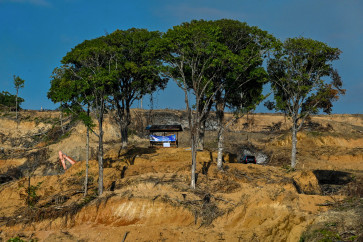Popular Reads
Top Results
Can't find what you're looking for?
View all search resultsPopular Reads
Top Results
Can't find what you're looking for?
View all search resultsReclamation may cause annual losses of Rp 178 trillion
A lawyer has claimed during the hearing of a lawsuit challenging Jakarta gubernatorial permits for the construction of man-made islets F, I and K in Jakarta Bay, that the controversial reclamation and Giant Sea Wall projects have the potential to cause losses amounting to trillions of rupiah every year
Change text size
Gift Premium Articles
to Anyone
A
lawyer has claimed during the hearing of a lawsuit challenging Jakarta gubernatorial permits for the construction of man-made islets F, I and K in Jakarta Bay, that the controversial reclamation and Giant Sea Wall projects have the potential to cause losses amounting to trillions of rupiah every year.
Martin Hadiwinata, a lawyer for the plaintiffs the Coalition to Save Jakarta Bay Movement, said after the hearing at the Jakarta State Administrative Court (PTUN) on Wednesday that his team had submitted written documents as proof that the projects brought many disadvantages for residents and the environment.
Martin said the total losses from the projects could amount to Rp 178.1 trillion (US$13.76 billion). The figure was calculated using three components only. “They comprise the loss of fishing grounds, the threat of flooding and the loss of mangroves,” he said.
A research document, entitled “Jakarta Bay Recommendation Paper”, by Denmark-based consultant company DHI Water and Environment at the request of the Environment and Forestry Ministry in 2012, showed that the estimated loss of 586.3 hectares of fishing grounds could cause a total loss of $1.36 billion in livelihoods annually.
Meanwhile, the increased risk of flooding is estimated to cause losses of $9.7 billion and the loss of mangrove habitat, including its role as coastal protection would cause losses of $2.7 billion.
Martin said the total loss excluded the potential reduction in electricity generated at Muara Karang and Muara Tawar power plants, which could reach $26.78 million. “Both power plants fulfill 53 percent of Jakarta’s electricity needs,” he said.
The developer-driven reclamation project, which comprises the construction of 17 artificial islets in Jakarta Bay, has been rejected by many residents and environmentalists, who argue that the projects only benefit private companies and will cause great danger to the environment.
The project came into the national spotlight after a City Council member was allegedly caught red-handed while receiving bribes from property development company Agung Podomoro Land (APL) whose subsidiary holds the permit for building Islet G.
The coalition previously won their lawsuit challenging the permit for Islet G.
The construction of all islets has been suspended by the central government. The government has formed a task force from various ministries, including the Environment and Forestry Ministry, the Maritime Affairs and Fisheries Ministry, the National Development Planning Board (Bappenas) and the Coordinating Maritime Affairs Ministry to reevaluate the projects.
President Joko “Jokowi” Widodo recently said the project would continue as part of the Giant Sea Wall, or the National Coastal Integrated Capital Development (NCICD), mega project.
Nadia, lawyer for the city administration, said her side had also submitted two documents as evidence.
“We gave the recommendation letters of the BPLHD [Environmental Management Agency] on environmental permits and AMDAL [environmental impact analyses],” she said, declining to elaborate further.
Oswar Muadzin, the assistant to the governor on spatial planning and the environment, made it clear that the city administration had no intention of halting the project.
“We’ll simply repeat the permit issuance process should the court annul the permits,” he said when asked whether the city would stop the project once and for all if the court so ordered.
Oswar argued that the project was for the public good. “Those who are going to live in the islets are members of the public. They are also our citizens,” he said.










